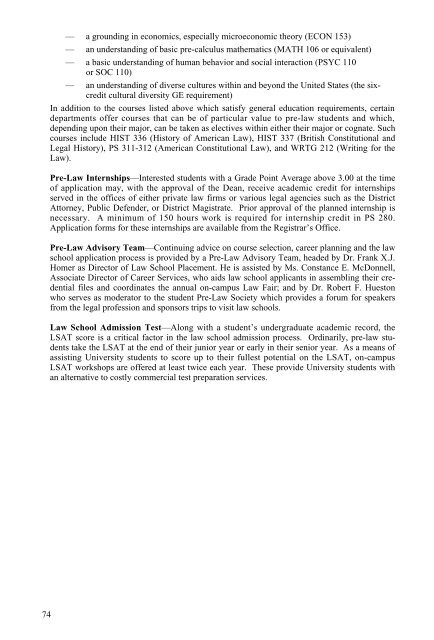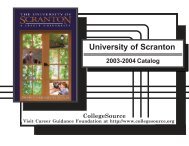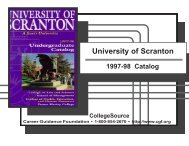- Page 1 and 2:
The University of Scranton 1998-99
- Page 3 and 4:
1998-1999 UNIVERSITY OF SCRANTON AC
- Page 5 and 6:
TABLE OF CONTENTS Page WHERE POTENT
- Page 7 and 8:
THE SEAL OF THE UNIVERSITY OF SCRAN
- Page 9 and 10:
STATEMENT OF MISSION 1. The Univers
- Page 11 and 12:
10. The University of Scranton is c
- Page 13 and 14:
The Society annually presents the A
- Page 15 and 16:
ALPHA KAPPA DELTA* International Ho
- Page 17 and 18:
FULBRIGHT AND OTHER INTERNATIONAL F
- Page 19 and 20:
16 1986 Margaret Husosky...........
- Page 21 and 22:
Center and the Commons. It is marke
- Page 23 and 24:
20 Undergraduate Admission Expenses
- Page 25 and 26: Applicants without high school cred
- Page 27 and 28: STUDENT EXPENSES ROOM AND BOARD —
- Page 29 and 30: TUITION AND FEES ACADEMIC YEAR 1998
- Page 31 and 32: Credit Requirements: Full-time stud
- Page 33 and 34: THE DAVID W. HAWK SCHOLARSHIP—to
- Page 35 and 36: THE FRANK A. AND HELEN S. BACIEWICZ
- Page 37 and 38: education. The award is given to pr
- Page 39 and 40: REV. STEPHEN A. KOLLAR MEMORIAL AWA
- Page 41 and 42: THE MARIAN M. AND PATRICK F. O’HA
- Page 43 and 44: THE KATHRYN AND BERNARD HYLAND MEMO
- Page 45 and 46: 42 Academic Program The University
- Page 47 and 48: DOUBLE MAJOR PROGRAM Students at th
- Page 49 and 50: SECOND AND THIRD YEAR GE ELECT Stud
- Page 51 and 52: SUBJECT MATTER MASTERY THE HUMAN PE
- Page 53 and 54: INTEGRATION OF INDIVIDUAL AND COMMU
- Page 55 and 56: FRESHMAN OPTION: GENERAL AREA STUDI
- Page 57 and 58: should consult with the instructor
- Page 59 and 60: ATTENDANCE POLICY Students are expe
- Page 61 and 62: STUDENT RIGHTS AND CONFIDENTIALITY
- Page 63 and 64: SPECIAL JESUIT LIBERAL ARTS PROGRAM
- Page 65 and 66: HONORS PROGRAM DR. ELLEN CASEY, Dir
- Page 67 and 68: OTHER INTERDISCIPLINARY PROGRAMS EA
- Page 69 and 70: 66 HUMAN DEVELOPMENT DR. BUCHANAN,
- Page 71 and 72: WOMEN’S STUDIES CONCENTRATION DR.
- Page 73 and 74: 70 ITALIAN STUDIES CONCENTRATION DR
- Page 75: 72 INTERNSHIP PROGRAMS The Universi
- Page 79 and 80: 76 The University offers all applic
- Page 81 and 82: 78 AS 111/112/211/212 AS 303/304/40
- Page 83 and 84: ART AND MUSIC DR. DeMICHELE, Chairp
- Page 85 and 86: ARTH 220 Staff History of Photograp
- Page 87 and 88: BIOLOGY DR. TOWNSEND, Chairperson C
- Page 89 and 90: BIOL 245 Staff * General Physiology
- Page 91 and 92: BIOL 445 Dr. Kwiecinski Mammalian P
- Page 93 and 94: BIOCHEMISTRY The Bachelor of Scienc
- Page 95 and 96: 92 CHEMISTRY-COMPUTERS The program
- Page 97 and 98: In cases where a student withdraws
- Page 99 and 100: CHEM 450L Staff (W)Biochemistry Lab
- Page 101 and 102: 98 COMMUNICATION Dept. and No. Desc
- Page 103 and 104: COMM 232 Staff Film History 3 credi
- Page 105 and 106: COMM 481 Staff Internship 3 credits
- Page 107 and 108: COMPUTER INFORMATION SYSTEMS This p
- Page 109 and 110: CMPS 352 Operating Systems 3 credit
- Page 111 and 112: CJ 110 Staff (S)Introduction to Cri
- Page 113 and 114: ECONOMICS DR. GHOSH, Chairperson Th
- Page 115 and 116: ELECTRONICS-BUSINESS The state of t
- Page 117 and 118: PRE-ENGINEERING The University prov
- Page 119 and 120: EE 344 Dr. Zakzewski Electronic Cir
- Page 121 and 122: ENGL 119-120 Dr. Jordan Masterworks
- Page 123 and 124: ENGL 221 Dr. Jordan, Prof. Hill (C)
- Page 125 and 126: ENGL 333 Dr. Gougeon The Developmen
- Page 127 and 128:
THEATRE DR. ROBBINS, Program Direct
- Page 129 and 130:
THTR 370 Prof. Larsen Technical The
- Page 131 and 132:
WRTG 310 Dr. Rakauskas Written Comm
- Page 133 and 134:
ENVIRONMENTAL SCIENCE Dept. and No.
- Page 135 and 136:
132 FOREIGN LANGUAGE Dept. And No.
- Page 137 and 138:
FREN 421 Staff Medieval and Renaiss
- Page 139 and 140:
JAPANESE JAP 101-102 Staff (C)* Ele
- Page 141 and 142:
GRK 111-112 Staff (C)Elementary Gre
- Page 143 and 144:
HISTORY DR. DeMICHELE, Chairperson
- Page 145 and 146:
HIST 140 Staff (W) The Craft of the
- Page 147 and 148:
HIST 312 Dr. Champagne The Early Na
- Page 149 and 150:
MATHEMATICS DR. JASINSKI, Chairpers
- Page 151 and 152:
MATH 312 Probability Theory 3 credi
- Page 153 and 154:
MINOR IN LEADERSHIP Leadership is t
- Page 155 and 156:
NEUROSCIENCE DR. CANNON, Director T
- Page 157 and 158:
154 PHILOSOPHY Dept. and No. Descrp
- Page 159 and 160:
PHIL 312 Dr. Rowe Modern Philosophy
- Page 161 and 162:
PHYSICS DR. SPALLETTA, Chairperson
- Page 163 and 164:
PHYS 104 Dr. Zakzewski (E)Introduct
- Page 165 and 166:
POLITICAL SCIENCE DR. CHAMPNEY, Cha
- Page 167 and 168:
PS 216 Dr. Harris Gender and the Wo
- Page 169 and 170:
PS 329 Dr. VanDyke The American Pre
- Page 171 and 172:
Dept & No PSYCHOLOGY Descriptive Ti
- Page 173 and 174:
PSYC 390 Staff Academic and Career
- Page 175 and 176:
GERONTOLOGY The degree program in G
- Page 177 and 178:
SOC 231 Prof. Pryle Urban Sociology
- Page 179 and 180:
THEOLOGY AND RELIGIOUS STUDIES DR.
- Page 181 and 182:
T/RS 225 Fr. Sable, S.J. Introducti
- Page 183 and 184:
T/RS 325 Fr. Levko, S.J. Eastern Ch
- Page 185 and 186:
182 The School of Management Ronald
- Page 187 and 188:
THE BUSINESS LEADERSHIP PROGRAM Dr.
- Page 189 and 190:
ACCOUNTING-MANAGERIAL ACCOUNTING TR
- Page 191 and 192:
ACC 473 Dr. Ellis, Staff Advanced A
- Page 193 and 194:
ECO 101 Staff (S)Current Economic I
- Page 195 and 196:
FINANCE The practitioner in FINANCE
- Page 197 and 198:
INTERNATIONAL BUSINESS DR. TRUSSLER
- Page 199 and 200:
MANAGEMENT DR. BIBERMAN, Chairperso
- Page 201 and 202:
MGT 471 Drs. Biberman, McKeage Grou
- Page 203 and 204:
MKT. 351 Staff Introduction to Mark
- Page 205 and 206:
STAT 251 Drs. Gnanendran, Gougeon,
- Page 207 and 208:
COUNSELING AND HUMAN SERVICES FR. M
- Page 209 and 210:
HS 335 Staff Administration in Huma
- Page 211 and 212:
PROGRAM: EARLY CHILDHOOD EDUCATION
- Page 213 and 214:
PROGRAM: SECONDARY EDUCATION (BIOLO
- Page 215 and 216:
PROGRAM: SECONDARY EDUCATION (COMMU
- Page 217 and 218:
PROGRAM: SECONDARY EDUCATION (GENER
- Page 219 and 220:
PROGRAM:SECONDARY EDUCATION (MATH)
- Page 221 and 222:
PROGRAM: SECONDARY EDUCATION (PHYSI
- Page 223 and 224:
SPECIAL EDUCATION Dept. and No. Des
- Page 225 and 226:
EDUC 265 Dr. Hobbs SPED Educational
- Page 227 and 228:
EDUC 451 Staff Early Childhood 5 cr
- Page 229 and 230:
HEALTH ADMINISTRATION Concentration
- Page 231 and 232:
HADM 315 Staff (D)Cultural Diversit
- Page 233 and 234:
Dept. and No. NURSING Descriptive T
- Page 235 and 236:
NURS 440 Drs. Hudacek, Narsavage, C
- Page 237 and 238:
OCCUPATIONAL THERAPY Dept. and No.
- Page 239 and 240:
PHYSICAL EDUCATION DR. WODDER, Chai
- Page 241 and 242:
PHYSICAL THERAPY DR. BARNES, Chairp
- Page 243 and 244:
PHYSICAL THERAPY FIFTH YEAR (Summer
- Page 245 and 246:
PT 360 Dr. Sanko Clinical Sciences
- Page 247 and 248:
244 Dexter Hanley College Shirley M
- Page 249 and 250:
The Dexter Hanley College baccalaur
- Page 251 and 252:
absence. Students who do not attend
- Page 253 and 254:
B.S. IN NURSING FOR R.N. STUDENTS D
- Page 255 and 256:
LIBERAL STUDIES The Liberal Studies
- Page 257 and 258:
COMPUTER INFORMATION SYSTEMS Genera
- Page 259 and 260:
HEALTH ADMINISTRATION General Educa
- Page 261 and 262:
CERTIFICATES FOR ACADEMIC CREDIT A
- Page 263 and 264:
CERTIFICATES IN GERONTOLOGY* (24 cr
- Page 265 and 266:
TELECOURSES Telecourses provide DHC
- Page 267 and 268:
TUITION AND FEES 1998-99 Dexter Han
- Page 269 and 270:
Oppenheim Family Award This fund wa
- Page 271 and 272:
268 The Graduate School Robert E. P
- Page 273 and 274:
priate undergraduate program dean,
- Page 275 and 276:
EXTRACURRICULAR ACTIVITIES THEATRE
- Page 277 and 278:
Royals national basketball title in
- Page 279 and 280:
WELLNESS CENTER — The mission of
- Page 281 and 282:
Rev. Michael G. Boughton, S.J. John
- Page 283 and 284:
Panos Apostolidis, Ph.D. (1977-1989
- Page 285 and 286:
Michael C. Cann, D. et U. * (1975)
- Page 287 and 288:
Thomas W. Gerrity, D. et U.* (1976)
- Page 289 and 290:
Dennis S. Martin (1985) Associate P
- Page 291 and 292:
Robert P. Sadowski (1987) Professor
- Page 293 and 294:
Anthony Agati (1995) Assistant Dire
- Page 295 and 296:
John Greggo (1997) Coordinator, Cou
- Page 297 and 298:
Phillip Odom (1996) Counselor/Minor
- Page 299 and 300:
Susan Williams-Quinlan (1989) Direc
- Page 301 and 302:
Virginia Clarke B.S.N., Wilkes Univ
- Page 303 and 304:
Edward G. Mathews, Jr. Foreign Lang
- Page 305 and 306:
Philip Yevics Theology B.S., Univer
- Page 307:
INDEX Academic Advising Centers 276
















